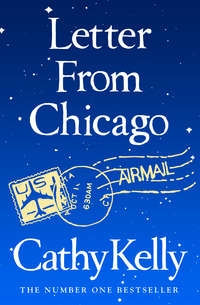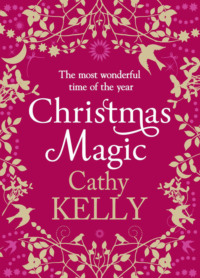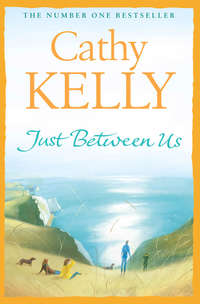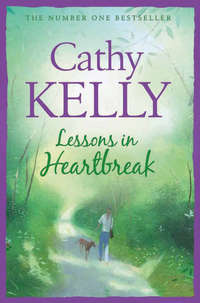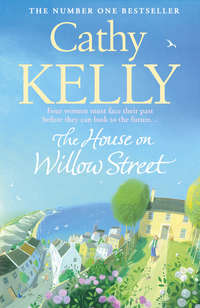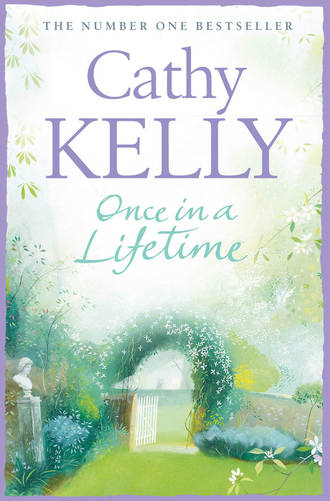
Полная версия
Once in a Lifetime
In reply, he muttered something she didn’t quite hear.
With one last gentle pat, she drew the sheet up around his waist, then got out of bed to go through her night-time routine. Cleanse, moisturise and brush teeth. As she stood in the bathroom and carefully creamed her skin with body lotion, she reflected again on how no cosmetic could make a person feel beautiful the way being loved did.
2
Be true to yourself. Sounds mad, doesn’t it? I mean, what’s true? But you’ll know when you get there, trust me on this.
The following Saturday night Natalie Flynn sat on a barstool in Club Laguna, letting the music and the noise flow around her, and thought idly of her word for the day. Lodestone. A person or a thing regarded as a focus. Lodestone. Natalie rolled it around in her mouth. She looked up a new word in her dictionary every day. People with dyslexia were liable to have diminished vocabularies and Natalie knew she was one of them, so she’d bought a dictionary when she left school. Each day, she closed her eyes, opened a page and pointed.
When she was a kid, a boy in her school named Ben had dyspraxia. Natalie asked him what it meant.
‘I fall over things. Clumsy, they say.’
‘You’re not clumsy, you’re just a big person and the world is too small for you,’ she’d said. Ben was massive, with hands like giant hams. ‘They said I was stupid. Not my family, other people did. And it turned out I’m not; I’m dyslexic, that’s all.’
‘All the “dy” words are bad,’ Ben said gloomily. At the time, they were sitting outside Miss Evans’s room. Miss Evans took Special Education classes. People who didn’t have to go to Special Ed made Hunchback of Notre Dame faces and mouthed ‘special’ as if they had speech defects at people who did. Ben and Natalie were used to it. Natalie sometimes stuck her tongue out at the people involved, but not all the time.
She’d finally worked out that the people who teased about special education were the very ones in need of it themselves.
Ben and Natalie considered the dy words.
Dyspraxia–called clumsy by stupid people.
Dyslexia–word blindness was how Natalie liked to describe it.
‘Dysfunctional,’ added Joanne, who was in her final year in school, and who went to Special Ed because she kept missing school. Joanne’s father was unreliable, which Natalie realised was some sort of adult code for crazy. During his unreliable periods, Joanne didn’t turn up for school much, which meant she would not be doing her Leaving Cert exams with everyone else in her class.
Natalie sometimes wondered what Joanne was doing now. Joanne had seemed so grown up then, yet she’d only been four years older than Natalie. She’d be twenty-seven now.
Yesterday’s word had been opaque. Natalie had loved that. It was a word you could touch. Back on the farm in the small shed that she used as a studio, she had sifted the semi-precious stones through her fingers, working out which ones were opaque. Some tiger’s eye, lots of the misty smoky quartzes. Lodestone was a good word, too. She wondered how she’d never heard it before. That’s what she did as a jeweller: work with metals and stones to make talismans that hung around people’s necks or on their wrists, stones that meant something to them.
Lodestone. It could mean a person who was the focus of attention too, not just a thing. Sitting quietly on her barstool, a little apart from the other girls at Lizzie’s hen night, Natalie gazed around her and tried to apply her new word to her surroundings.
When they were alone or uncomfortable, other people read magazines or texted their friends. Because of her dyslexia, Natalie did neither. She hated text-speak; the strange jumble of letters seemed utterly wrong to her even when the predictive text gizmo claimed it was right.
‘You’re like my mother,’ said Molly, her flatmate. ‘She hates texting.’
Natalie smiled at the thought of being compared to the erudite Ingrid Fitzgerald, who’d probably read the entire dictionary cover to cover and committed it to memory. Molly’s mother was the sort of person who should have made her feel insecure, yet she didn’t. Ingrid wore her intelligence lightly, treating everyone with the same level of respect. Natalie never felt like an idiot in her presence.
‘Your mother only hates texting because it stops people being able to spell properly. I’ve never been able to spell in the first place.’
‘You spell just fine. You’re clever where it counts,’ Molly said. ‘Look at all the people we know who have degrees coming out their ears and are still clueless.’
They’d met at college while Natalie had been painfully trying to negotiate the written part of the foundation art course. Give her clay to mould, and she could spin poetry. But hand her a pen, and she was like a small child wielding a crayon and trying to work out the difference between the number six and the number nine. It was why she’d hated school.
She wished Molly was here tonight for the hen-night extravaganza but her flatmate, not being much of a party person, had elected to stay at home with the cats. Hopeless at small talk with humans, Molly talked to her beloved Bambi and Loopy as though they were her babies, all three of them curled up together on the couch watching TV. The cats liked programmes with fish in them best.
‘I love them too, but an hour of National Geographic just for them?’ Natalie had said before she left the house, complete with a sports bag jammed with hen-night paraphernalia, the pièce de résistance being fake zebra-skin cowboy hats.
‘We’re only watching till the end of this show,’ Molly said seriously, ‘and then we’re turning over to the salsa programme.’
Natalie nodded. ‘When the men with the white coats arrive, will I make them tea or coffee?’
Molly beamed a wide smile that lit up her small, round face and made her eyes dance. Apart from her eyes, she looked nothing like her famous mother. Short and adolescently skinny, she had reddish-brown curly hair that she liked to wear in a ponytail. Even when dressed for work and presiding over weighty reports on poverty, she looked about sixteen instead of twenty-three.
‘The men in the white coats had tea the last time,’ she said. ‘They might have coffee this. I know I’m mad, but I like the fish programmes too,’ she added. ‘Fish are very soothing. And there’s nothing else on TV tonight. I’m fed up with forensic science shows, they give me nightmares. There’s a good film on later.’
Something romantic, Natalie guessed fondly. Molly might work at the sharp end of society, but for relaxation, she devoured romantic novels and movies. The only thing that might get her off the couch was a real-life Johnny-Depp type in Regency costume with the desire to crush Molly to his manly bosom.
‘I got you a hat, just in case you wanted to come…’ Natalie plonked a zebra-skin cowboy hat on her friend’s head.
‘I love it!’ Molly sat up to adjust the hat, then wriggled back down into the couch. ‘I’m happier here, Nat, honestly. I’m no good at that party thing. I’d prefer watching it to being in the middle of it, but if you watch, everyone thinks you’re a weirdo. Besides, we haven’t organised a cat-sitter.’
‘See you later, crazy lady,’ said Natalie, leaving.
Lizzie always said that Natalie and Molly were bad for each other because they liked being home so much. Her idea of a good time didn’t involve cats, the TV or books. But then Lizzie didn’t appreciate that Natalie stayed in at night slaving away on her designs because she was determined to succeed as a jewellery designer. She couldn’t do that and be in clubs and pubs every night of the week like Lizzie. Natalie enjoyed going out when the mood took her. Though tonight, strangely, she wasn’t in the mood. Instead she was worried.
There had been such an emotional build-up to the hen night and Lizzie was so fiercely determined to have a good time, determined to have one last wild party before she tied the knot, that Natalie feared the evening wouldn’t end well.
Club Laguna itself was opaque, from the all subdued lighting that made you think you were wearing your sunglasses indoors. Even the mirrors behind the bar added to the effect: opaque glass and the lodestone was…Lizzie. Which was only fair; it was Lizzie’s hen night, after all.
Ten women from Lizzie’s life had been hauled together for this momentous party: Natalie and Anna from school, her two mad cousins from Donegal who’d rolled up looking like off-duty supermodels, a couple of girls from college and three from Lizzie’s office. The party had started three hours before in Lizzie’s flat and Lizzie clearly wanted it to go on all night. As the person charged with organising the whole thing, Natalie would have to stay to the bitter end. But she was tired. Working in the café in Kenny’s by day and designing her jewellery by night meant she had very little energy. Certainly not the energy Lizzie and the other hens seemed to have, energy for squealing as they admired dresses, shoes and passing men. Wearing their zebra cowboy hats–‘Nat, you genius! I love them!’–the hens were attracting plenty of attention from several predatory men. So far, all boarders had been repelled, although one guy–in a denim shirt that displayed his fabulous muscles and with a tiny skull-and-crossbones earring in one ear that showed off how cool he was–was watching from the sidelines, clearly pretty keen on Lizzie. He’d get bored, Natalie hoped.
She watched the barman diligently mix the cocktails. Swirl some crimson liquid into the shaker, do a little smooth move to impress the ladies, add something clear from a modern frosted glass bottle, crash in some ice, then shake.
The women clustered round the art deco glass bar murmured approval.
‘More vodka,’ shrieked Lizzie, a tousled brunette who was kneeling on the barstool so she could see all the action, though she’d definitely had enough vodka already. Four vodka tonics and a white wine spritzer, and now she’d ordered the bar’s speciality: the Laguna Beach, a concoction that came complete with a voucher for the Betty Ford Clinic. She’d already decided she wasn’t wearing enough make-up and had clumsily added another layer of eyeliner in the dark gloom of the ladies’ where you needed a torch to find the flush button on the loo. The dark and the drink combined had not resulted in a classy make-up look.
Natalie thought there was a business opening for anyone who patented a range of make-up bags with breathalyser gadgets fitted to their zips: once you were drunk, you couldn’t open the bag and start applying drag-queen levels of cosmetics.
She’d done it herself and had the photos to prove it. Marilyn Manson meets Picasso with a side order of vampire chic thrown in. It wasn’t a good look, given that she could pass for Gothic heroine easily enough anyway. Depending on what she wore, Natalie’s look could go either way: young and interesting or consumptively strange. She was pale-skinned, prone to purple shadows under her heliotrope eyes and with long ebony hair that never looked entirely brushed. In jeans and a T-shirt, her lean legginess and youthful skin gave her the look of a student, even though she was twenty-three and out of college. In tonight’s party outfit of sapphire-blue slip dress, she was working the girl-next-door-with-a-hint-of-edginess look.
‘Hot and sexy,’ Molly had decreed earlier when Natalie was getting ready. ‘But in control; not “I’m available, big boy” sexy, more “You can look, but don’t touch” sexy.’
Part of their routine was outfit-grading before they left the flat. Despite her own charity-shop look, Molly was brilliant at gauging outfits and their suitability for events. Natalie could do it with jewellery, but when it came to clothes, it was so easy to get it wrong.
‘That’s good. Don’t want to be too hot and sexy,’ Natalie said, pulling the slip dress down, wishing it was longer so it covered more leg. ‘It’ll be mad enough tonight as it is.’
‘More juice!’ she heard Anna yell to the Club Laguna barman, who winked at her as he wielded his shaker. Anna wasn’t much of a drinker. ‘I can’t stand feeling woozy,’ she said.
That statement was like a red rag to most men. In the many years the three girls had been friends–a bonding of five-year-olds in the school yard–Natalie had lost count of the number of guys who’d tried to get Anna to lose control, hoping that a few more sips of Chardonnay would make her unfurl her sweetly prim manner like a secretary in a cheesy movie letting down her hair. Lizzie, who was permanently unfurled and smiled at men like an eager puppy, was ignored in the rush to Anna.
‘It’s not fair,’ Lizzie used to say without bitterness. She adored Anna, even if her friend was a man magnet while she appeared to repel them.
‘It’s the hair,’ Anna said apologetically. ‘There’s some evolutionary thing about natural redheads; men love the hair. They’re programmed to want to mate with it. It’s nothing to do with me.’
‘It’s more than the hair,’ Lizzie would sigh. Anna was so perfect: tiny, perfectly proportioned and with those dancing pale blue eyes. Men loved how big she made them feel. She wore size three shoes and her wrists were as delicate as a porcelain doll’s.
And then Steve had come along. Without giving Anna a second look, he’d been instantly besotted with Lizzie.
Natalie wondered how Steve’s stag night was going. There had been talk of the men going to a lap-dancing club with Steve’s old college friend over from San Diego, but Lizzie had been outraged.
‘It’s supposed to be your last night out before marrying the girl you love, not an excuse to drool over naked women with figures like Barbie!’
It wasn’t the latent sexuality she had a problem with, Natalie knew: more that Lizzie wished she was a Barbie lookalike herself. The pre-wedding diet hadn’t been as successful as had been hoped. She was still eight pounds off her target weight and complained of appearing heifer-like.
‘I’ll look huge in the photos standing between you two,’ Lizzie had grumbled earlier as they changed into their party gear. She was wearing a silky slip dress with long trailing skirts and a tiny camisole bodice which was doing a mediocre job of holding her breasts in. She was not wearing a bra. Neither was Natalie, but then she was a 32A and Lizzie was a healthy 36D.
‘Oh, Lizzie, get down off the cross,’ muttered Natalie. ‘Somebody else needs the wood. We have three different looks, that’s all,’ she added, relenting. Lizzie’s figure anxiety was a barometer of her mood. In times of stress, it became more pronounced and she needed more reassurance. ‘Anna works the cute look, you do curvy and hot.’ Lizzie grinned despite herself. ‘And I’m the lanky one. I wish I had curves like yours.’
A lie, but a white one to make Lizzie feel better. Natalie’s stepmother, Bess, was a seamstress who made a lot of wedding dresses and Natalie had grown up hearing about bridal anxiety.
‘No you don’t,’ Lizzie replied, but she was smiling as she tried on her hen-night regalia.
As part of her preparations for the evening Natalie had dutifully bought pink fluffy horns, T-shirts emblazoned with Bride on Tour and had booked a booth in Laguna, a happening club where the karaoke machine got turned on at eleven and poles were put up on stage for anyone wanting to try pole dancing and willing to sign the insurance waiver first.
It was ten to eleven now. Lizzie knew there was a still long night ahead.
She was thrilled her friend was happy. Steve was such a nice guy: kind, polite, decent. But Natalie couldn’t help recalling how, when they were younger, the three of them had had such dreams about conquering the world. And now they were twenty-three and suddenly it seemed as if the world had shrunk. Anna was dating a guy who was perfect on paper but slightly dull in real life. Gavin worked in the bank, owned his own flat, played rugby with his old school friends at the weekend and wore rugby jerseys with the collars turned up. Give him another ten years and he’d have golf club membership and a rowing machine with clothes thrown over it in the bedroom. They used to laugh at guys like him, the safe guys, and now Anna was enraptured.
Lizzie was getting married in a week to the sweet and kind Steve–and she wouldn’t be wearing bright red, the way she’d always promised: ‘I’ll never go down the aisle in white: the roof of the church would fall in!!’
Instead, her dress was creamy lace with a bustier top to make the most of her assets; her dark curls would be covered by a demure veil, and the guest list included all the various horrors of relations that she’d sworn blind would never get invited.
‘You have to ask them,’ she’d said when Natalie dropped by and found her fretting over the seating plan. Great Aunt Mona couldn’t sit with Uncle Tom or they’d kill one another. They hadn’t met without rowing in fifty years and it was unlikely they were about to stop now.
‘Why do you have to ask them?’
‘Because, that’s why.’
‘You never see any of them, except at other people’s weddings and funerals. I thought this day was supposed to be about you and Steve, not the usual outdated cliché of a wedding with ninety awful second-cousins-once-removed.’
Lizzie grimaced at having her words quoted back at her.
‘My mother would die if we didn’t have a big wedding,’ she said. ‘You know what she’s like, Natalie. Anyway…’ Lizzie paused. ‘I know it sounds strange, but I like the idea of having them there. It makes it real when all the cousins and aunties show up. Like we wouldn’t be properly married if we did it on a beach somewhere without them all clucking over the waste of money spent on the flowers or giving out about the bones in the fish.’
Natalie laughed. ‘Point taken. But when they’re all squabbling because you’ve sat them too far from the top table, don’t say I didn’t warn you.’
‘Mum will sort them out,’ laughed Lizzie.
Once, thinking of Lizzie’s mum might have upset Natalie. When she was a child, she’d felt different because she didn’t have a mum. She wasn’t the only kid in her class to have an unusual family set-up. There were two kids whose dads lived elsewhere, and one boy who had two families: his mother and stepfather, and his dad and stepmother, plus assorted brothers and sisters. And there was Eileen, a quiet mouse of a girl with long strawberry blonde hair she wore like a curtain hiding her eyes. She lived on her own with her mother and went mute whenever any event came up that involved dads.
Eileen might not have had a dad, but she had a mother. Even when Natalie was seven and her mind was gently exploring such things, even when Eileen was by far the strangest kid in the class, even then Natalie knew that Eileen had something she didn’t: a real mother.
Dads sometimes got involved in other things or worked all hours, but mums didn’t. Mums were there. Except for Natalie Flynn’s. Her mum was dead. She had Bess instead, her stepmum, who was wonderful, and so kind, but still wasn’t her real mum. She’d said Natalie didn’t have to call her ‘Mum’, so Natalie hadn’t; and that simple thing, that name, had strangely made all the difference. Other kids had mums and dads: Natalie had Dad and Bess. And Bess, no matter how wonderful, wasn’t Mum.
Natalie forgot loads of things: the sheer pain of writing her thesis had burned off so many brain cells, but she’d never forget the first time she was asked:
‘What’s it like not to have a mum?’
Toby–now grown up and cute, and always friendly whenever she went to the garage he ran–had been a teacher’s nightmare at the age of seven: hyperactive and overfond of the word ‘why?’
Why does the sun go down at night?
Why are the people on the television so small?
Why do we have to go to school?
Why did your mum die? Are you still sad about her being dead?
Natalie could see her seven-year-old self: a skinny little thing, with those matchstick legs poking out of the grey-and-white school uniform and her dark hair tangled and coming out of its ponytail no matter how carefully Bess did it before she went to school.
‘I’m not sad,’ she’d said defiantly. Toby obviously wanted her to say she was sad, so it was important to say she wasn’t. Toby said girls couldn’t climb trees and she’d shown him he was wrong. She’d skinned her knees in the process, but she’d shown him.
‘I’m never sad.’
Had she stuck her tongue out at him then? That she couldn’t remember. Probably. Sticking out your tongue was a vital way of winning arguments when she was seven, akin to pulling wimpy girls’ hair and jumping on to any bit of wall to dance along it.
She’d gone home and told Dad and Bess what Toby had said, and they’d exchanged that look that grown-ups did when they didn’t want to answer the question.
She had no memory of what her father had said, although she could remember subsequent conversations: God takes people sometimes, we don’t know why.
God’s responsibility had shifted vastly when the ten-year-old Natalie had said: ‘I hate God.’
Bess hadn’t missed a beat. ‘We don’t always understand what God does. We just have to accept it.’
Natalie had never accepted it.
There were so many pluses in her life: a lovely family with Bess as the centrepoint, Dad being sweet and just a little bit not-of-this-planet, her half-brothers Ted and Joe, and good friends like Molly. She had so much, particularly when she looked at the disadvantaged kids whom Molly worked with. Compared to them, she was rich in every way. Yet Natalie felt as if there was a part of her missing.
Lizzie and Anna seemed to think that any missing bit could be fixed with the right man. Natalie felt it was more than that. But what exactly?
‘Hi, beautiful, can I buy you a drink?’ she heard the guy with the skull-and-crossbones earring ask Lizzie.
Natalie could see him reflected in the bar mirror. He was tall, and good-looking enough for one of Lizzie’s model cousins to be giving him a hard, appreciative stare. Natalie took in the tousled fair hair and the honed body. She also saw Lizzie’s lustful look.
‘No thanks,’ Natalie broke in as politely as she could. ‘It’s a hen night. No men allowed.’
‘Spoilsport,’ murmured Lizzie, leaning on Natalie and smiling up at the guy.
‘No, really, no guys allowed,’ Anna said firmly, hauling Lizzie away.
He shrugged and walked off.
‘He was cute,’ Lizzie sighed. ‘I could take him for a test drive…?’
Anna and Natalie exchanged a look. It was indeed going to be a long night.
It was nearly two when Anna and Natalie realised that Lizzie was missing. The group had been dancing non-stop, so each time Natalie came back to their booth and didn’t see Lizzie, she assumed her friend was dancing with the other girls.
‘I thought the same,’ said Anna, shouting so they could hear each other over the music.
Nobody else had seen her for an hour.
Natalie found Lizzie first. At the very back of the club, in a dimly lit spot beside the fire exit, she was perched on a man’s lap with her arms wrapped around his body and her mouth clamped to his as if they were giving each other mouth-to-mouth resuscitation. One of his hands was tangled up in Lizzie’s dark hair, the other was burrowing up under her flirty dress, so her thigh was totally bared.
Natalie’s first thought was that her friend must be comatose to be behaving like this, but then she looked again. Lizzie was as ardent as the guy: she was writhing around on his lap, plunging her tongue into his mouth. It was the same guy who’d made a move on Lizzie earlier, the one with the denim shirt and the skull-and-crossbones earring. Lizzie had wanted this, Natalie realised: she was a willing partner.
‘Lizzie!’ shouted Natalie, trying to be heard over the throbbing bass notes of the music. ‘Lizzie!’
She shook her friend’s arm and Lizzie turned round, the crimson lipstick almost gone from her lips, leaving nothing but a giant red Munch-like scream smeared around her mouth from kissing. She smiled lazily at her friend, snuggled close to the man’s chest. Her eyes glittered with raw excitement.


